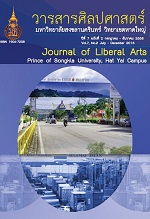The investigation of vocabulary knowledge and scores of Ordinary National Educational Test (O-NET) as indicators of freshmen’s potential in learning the compulsory English course at Yala Rajabhat University
Keywords:
vocabulary knowledge, O-NET scores, potential achievement in a compulsory English course, first year studentsAbstract
The purpose of this study was to investigate the potentiality of the following two factors (namely learners’ vocabulary knowledge and their scores of Ordinary National Educational Test (O-NET)) as indicators of freshmen’s potential in learning the compulsory English course. In order to conduct the study, 250 freshmen at Yala Rajabhat University were selected through Multi-stage Sampling. Then, their O-NET scores were used to divide the selected students into two groups: low and high proficiency. Next, in order to measure their vocabulary knowledge, Nation’s Vocabulary Levels Test (Version 2) was applied. An achievement test for the course “English for Communication” was administered in order to determine their achievement levels. The O-NET scores were also used to determine the proficiency levels required for the study. Mean, Standard Deviation, Percentage, and Pearson Correlation Coefficient were used to analyze the data. The findings revealed that the average vocabulary size of all the subjects was around the 2,000 word level, while their average score of O-NET was 17.86. The size of vocabulary was significantly related to the O-NET scores, and to the achievement test in English for Communication Course at .01. The O-NET scores were significantly related to the achievement test in English for Communication Course at .01. It can be assumed that both vocabulary knowledge and O-NET scores can be used as indicators for success in their compulsory English course. This can be useful for grouping students and managing the teaching and learning process corresponding with their potential.
Downloads
Published
How to Cite
Issue
Section
License
Copyright (c) 2016 วารสารศิลปศาสตร์ มหาวิทยาลัยสงขลานครินทร์ วิทยาเขตหาดใหญ่ (Journal of Liberal Arts Prince of Songkla University Hat Yai)

This work is licensed under a Creative Commons Attribution-NonCommercial-NoDerivatives 4.0 International License.
The authors retain the copyright to their article but the Journal of Liberal Arts, Prince of Songkla University reserves the exclusive rights to first publication.






